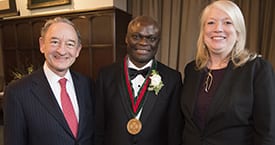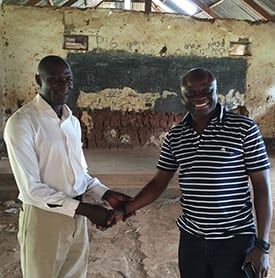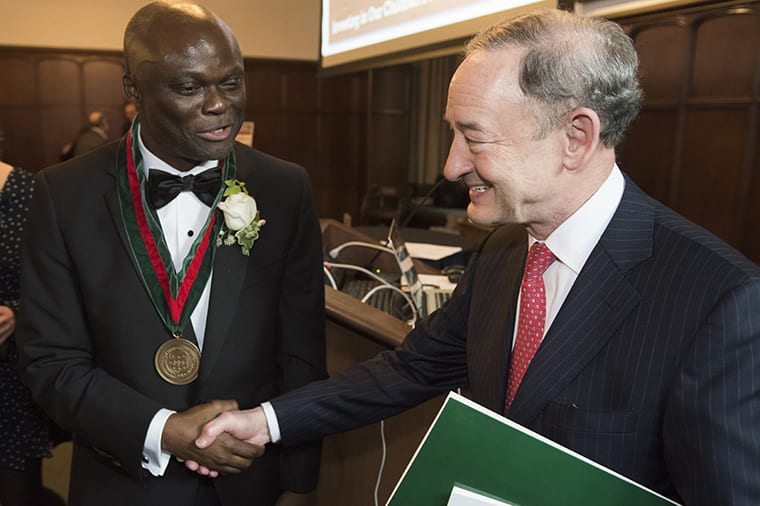On February 8, Fred Melch Ssewamala, PhD, a renowned social and economic development scholar, was installed as the William E. Gordon Distinguished Professor at the Brown School of Social Work.

Chancellor Mark S. Wrighton welcomed a standing-room-only audience of supporters and collaborators who came from as far as Hong Kong, Uganda and Zimbabwe to celebrate the work of Dr. Ssewamala.
The chancellor praised him as a truly gifted educator and researcher. “He has a strong vision for improving life chances and long-term developmental impacts for children and adolescent youth,” Wrighton said.
Ssewamala, who was born in Uganda, knows adversity firsthand. His mother died when he was 3, and when he was 11 he witnessed the murder of his father and stepmother during the height of the war in Uganda in the 1980s.

“I grew up not only as an orphaned child, but I also grew up poor in Uganda,” he said. He survived with the support of relatives and found solace in his studies. (He is shown at right with one of his teachers during a visit to Uganda. Dean Mary McKay took the photo.)
“Going through school, I always knew that I wanted to be in a helping profession to give back to the community that raised me. That is partly why I do the work that I do.”
Scientific rigor
Today Ssewamala leads interdisciplinary research focused on family-based economic empowerment and social protection interventions. The work aims to improve the health, mental health and educational outcomes of children and adolescent youth, particularly those impacted by poverty and HIV/AIDS in sub-Saharan Africa.
At his installation, Ssewamala presented “Economic Empowerment Interventions for Poverty and AIDS Impacted Children and Adolescents: Lessons from 15 Years of Research in Sub-Saharan Africa.”
“It is research intended to find real-world innovative solutions to developmental and health challenges faced by children growing up in families and communities similar to the ones that raised me: poor and vulnerable,” he said. “It is work rooted in scientific rigor, but also the values of social justice and dignity for all.”
Ssewamala received his bachelor’s degree in social work and social administration at Makerere University in Kampala, Uganda. After he graduated, he worked for as a program officer at the Uganda Red Cross. The experience led him to study economic development at the Brown School, graduating with a Master of Social Work in 1999.
While at the Brown School, Ssewamala was a research associate at the Center for Social Development (CSD) and provided loan counseling at the Justine Petersen Housing and Reinvestment Corp. Ssewamala’s mentor was Michael Sherraden, founding director of CSD, where Ssewamala is faculty director of Global Asset Building.
Ssewamala stayed at the Brown School to earn his doctorate, focusing his research on social and economic development, specifically microfinance and asset-building among low-income families. With his PhD in 2003, Ssewamala joined the faculty at Columbia University with a joint appointment in the School of Social Work and the School of International and Public Affairs.
In 2013, Ssewamala founded the International Center for Child Health and Development (ICHAD). Now based at the Brown School, ICHAD contributes to the reduction of poverty and improvement of health outcomes for children, adolescent youth and families in low-resource communities.
“We were fortunate to recruit Professor Ssewamala back to the Brown School this summer,” said Dean McKay, who has known Ssewamala since he graduated from his doctoral program in 2003. She affectionately calls him “Dr. Fred.”
McKay has visited his village in Uganda, where she met his childhood teachers and extended family members, and has mentored and collaborated with Ssewamala on multiple National Institutes of Health (NIH)-funded studies in sub-Saharan African countries, including Uganda, Kenya, Ghana and South Africa.
In addition to ICHAD, Ssewamala brought to the Brown School three large-scale, NIH-funded studies that he is conducting in Uganda.
“Drawing Professor Ssewamala to join our incredible faculty is something I have been so thrilled about,” she said. “He fits in perfectly in our school community, one that he was of course already part of, and is already living up to his distinguished professor role.”
William E. Gordon
Gordon was an important figure in Brown School history. He was best known for establishing the school’s social work doctoral program, one of the nation’s first. Edward F. Lawlor, McKay’s predecessor as Brown School dean, was the inaugural holder of the distinguished professorship in Gordon’s name.
“Professor Gordon pushed the field of social work to embrace a truly scientific approach,” Lawlor said. He was trained as a scientist, a quantitative ecologist, and he felt it incumbent for this field to combine strong theory and conceptualization with evidence, to build a knowledge base for practice, and “to feed all that back in the training of graduate students,” Lawlor said.
“It is a great honor to be installed as the William E. Gordon Distinguished Professor,” Ssewamala said. “He was a great man, and I am grateful for the opportunity to continue his commitment to science in honor of his legacy.”
